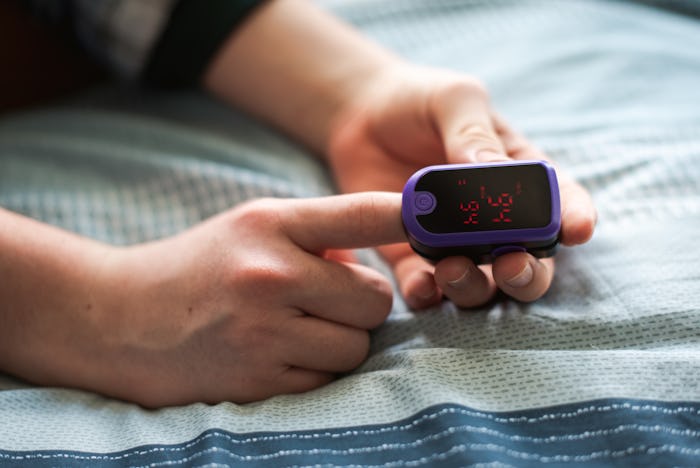Life

Pulse Oximeters Are The New Pandemic Purchase Trend, But Does Your Family Need One?
Many of us have purchased things during this pandemic that we never thought we would, such as face masks and 5-gallon buckets of bleach. But the latest products people are buying en masse are pulse oximeters. But is it necessary? Should you buy a pulse oximeter?
Many of us have already read the New York Times article citing untreated and unrecognized pneumonia as the "silent killer" of COVID-19 patients and were suitably horrified. The opinion piece, written by emergency room physician Dr. Richard Levitan, told the story of people who come in to be treated for COVID-19, but they're still able to move, still talking on their phones, and all the while, their blood oxygen readings are showing that they are clearly in need of oxygen. Later tests go on to show pneumonia devastating their lungs. Clearly, it scared people into action, because pulse oximeters are selling out everywhere. But should you buy one?
Dr. George Fallieras, who works at Los Angeles Surge Hospital, the hospital designated for COVID-19 patients, tells Romper, "Normally no one needs a pulse oximeter at home, but since hypoxemia is a classic sign of more severe COVID-19 infection, it might be useful to have this inexpensive device at home and monitor your oxygenation."
But ophthalmologist Yuna Rapoport tells Romper that because of the possibilities of false positive readings from the pulse oximeter, it might be best for those with additional concerns. "If you have chronic conditions and are susceptible to getting ill with COVID (asthma, chronic obstructive pulmonary disorder, heart disease, diabetes), then it is a good idea to get a pulse oximeter," she says. Beyond that, we need to be cautious about how and why we are using them. As parents, we want to have every possible tool in our arsenal to keep our children healthy — and that includes staying healthy ourselves. Whether you're using a pediatric pulse oximeter or one meant for adults, both need to be used with prudence.
Emergency medicine physician Alan Dennington agrees with Rapoport that a pulse ox should only be used with a high level of caution, as user error is rampant with pulse ox meters. "I believe using a pulse oximeter at home could provide some benefit, but should not be solely relied upon to make medical decisions. Factors such as nail polish, cold fingers, or movement while measuring can cause artificially low numbers." Not only that, but Dennington also says you can be very short of breath and still maintain a normal level on the device. "Underlying medical conditions or environmental factors can also affect your baseline values."
But if you're using it to document your readings over time, that might be more helpful. "A trend toward lower numbers over several measurements and knowing what your baseline is can make the readings more valuable," he says, adding that if you do use one, you should use it in conjunction with other metrics — like your overall feeling, temperature, and other symptoms — to determine what your medical needs are.
The biggest takeaway is that you should not be taking these readings as the be-all-end-all if you do buy a meter. You need to be in frequent contact with your healthcare provider, following the plan they prescribe, and regularly checking in with your own body. A pulse oximeter can be a good tool, but it can't be your only tool.
Experts:
Dr. George Fallieras, Medical Director of BioCorRx and double board-certified M.D. at Los Angeles Surge Hospital